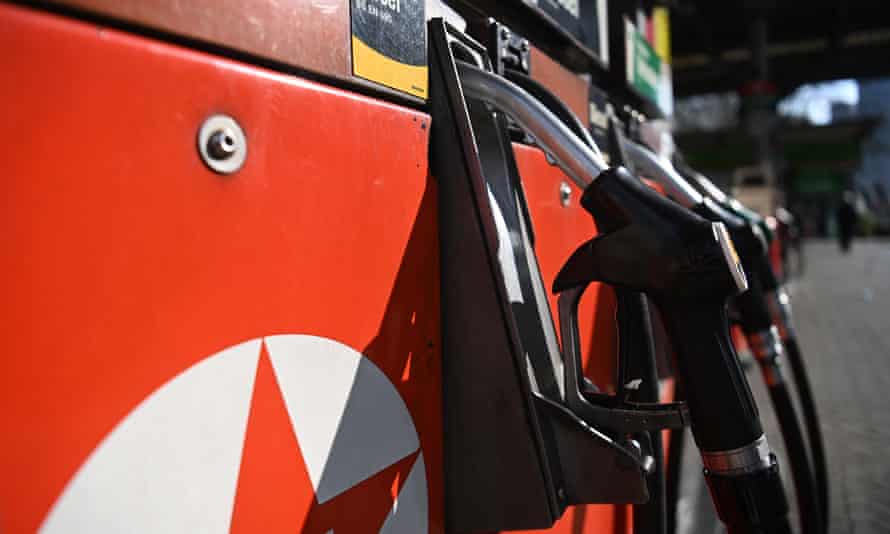Britain’s most vulnerable households will face the full force of the biggest squeeze on living standards on record after Rishi Sunak targeted better-off workers for help in his £9bn mini-budget package of tax and duty cuts.
The chancellor responded to the highest inflation in three decades with a 5p-a-litre cut in fuel duty and a £3,000 increase in the threshold for national insurance contributions but faced immediate and widespread criticism for failing to shield pensioners and those dependent on state benefits from the impact of a cost-of-living crisis.
In what he boasted was the biggest package of tax cuts in a quarter of a century, Sunak cut fuel duty by 5p a litre – taking prices back to their level of a week ago – and said the NI change would benefit the average worker by about £6 a week.
In the most surprising move, the chancellor then announced a 1p cut in income tax to 19p, which will come into force in April 2024, the month before the day earmarked by the government for the general election.
The independent Office for Budget Responsibility (OBR) said the spring statement had given back only a sixth of the tax increases announced by Sunak during his two years as chancellor and that even after these measures, living standards would fall by more than 2% this year – what it said would be the steepest drop since records began in the 1950s.
A snap poll carried out by YouGov on Wednesday suggested the public were underwhelmed by Sunak’s spring statement. Just 6% of people said he had done enough to tackle the cost of living crisis, while 69% felt he had not done enough.
Living standards are expected to fall sharply as wages and state benefits fail to keep pace with rising prices. The Office for National Statistics said on Wednesday that the annual inflation rate had risen to 6.2% – its highest since 1992 – but the OBR said it was on course to hit levels not seen since the early 1980s later this year when sharply higher energy bills bite.
Paul Johnson, the director of the Institute for Fiscal Studies thinktank, said: “In the face of what the OBR calls the biggest hit to household finances since comparable records began in 1956-57 he has done nothing more for those dependent on benefits, the very poorest, besides a small amount of extra cash for local authorities to dispense at their discretion. Their benefits will rise by just 3.1% for the coming financial year. Their cost of living could well rise by 10%.”
Despite slashing its growth forecast for 2022 from 6% to 3.8%, the OBR said borrowing in the current financial year would be £55bn lower than it had forecast last October.
Government departments will also feel the squeeze from rising inflation – expected to peak at almost 9% this year – because the money allocated in last year’s spending round will not go as far. Sunak said he would double the government’s household support fund – a pot of cash allocated to local councils to help struggling families – to £1bn.
Speaking on the second anniversary of the first pandemic lockdown, Sunak said the economic sanctions imposed on Russia would “not be cost free” and presented a risk to the recovery from Covid-19.

Sara Ogilvie, the policy director of the Child Poverty Action Group, said: “Today the chancellor could have helped millions of families cope with spiralling costs – but instead he failed the children who needed him the most. The measures he announced don’t come close to bridging the gap between what the lowest income families have and what they need, and will leave many stranded in the face of the highest prices in a generation.”
Phil Andrew, the chief executive of the debt charity StepChange, said: “The additional £500m to the household support fund is of course welcome, but a drop in the ocean in terms of addressing the scale of need among the most financially vulnerable households in the light of the dramatic rise in the cost of living. We are now really worried that there will be an increase in the number of households who simply won’t be able to make ends meet.”
The Resolution Foundation thinktank said two out of every three pounds from the chancellor’s giveaways would go to those in the richest half of the population. The OBR warned households to be ready for a jump in the energy price cap from £1,971 to £2,800 a year in October.
Sunak’s decision to lift the national insurance threshold followed months of pressure from cabinet colleagues and Tory backbenchers over April’s NICs increase, which they fear will be deeply unpopular with voters. After Wednesday’s statement, the Treasury pointed out that 70% of taxpayers will now not pay any more NICs when it comes into force.
The shadow chancellor, Rachel Reeves, painted it as a partial U-turn, saying: “We said it was the wrong tax. Wrong time. Wrong choice. Today the chancellor all but admitted he got that one wrong.”
She attacked Sunak for failing to grasp the scale of the hardship facing many people in the coming months.
“Ordinary families, disabled people and pensioners are facing really difficult choices,” Reeves said. “Mums skipping meals so that their children don’t. Families struggling to buy new school shoes and uniforms for their children.”
The Liberal Democrat leader, Ed Davey, called the statement the “Sunak swindle”, highlighting the fact that while the chancellor hailed his plans for tax cuts, the OBR’s analysis shows the overall tax burden is still set to rise.
“People facing the biggest drop in living standards on record will see through the chancellor’s spin,” he said.
Even the Centre for Social Justice, the thinktank co-founded by former Conservative leader Iain Duncan Smith, highlighted the lack of help for the poorest families.
Sign up to the daily Business Today email or follow Guardian Business on Twitter at @BusinessDesk
“The reality is this cost of living crisis is just getting started – and today we needed to see a strategy for those struggling the most,” a CSJ spokesperson said. “Universal credit remains the best weapon in government’s arsenal to get support directly to those who will be worst hit by the spike in energy prices, while also helping claimants into work.”
Sunak’s statement was enthusiastically welcomed by Conservative backbenchers, many of whom had been pressing him to give a timetable for future tax cuts.
Former Brexit secretary David Davis said: “I am glad that Rishi Sunak has finally unveiled a road to cutting tax. I will look forward to standing alongside him and our party in 2024, on a platform that promises the first income tax cut in 16 years.”
Source: Guardian



